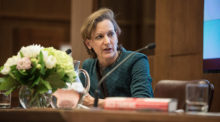Presented annually by the Lionel Gelber Foundation, in partnership with the Munk School of Global Affairs and Foreign Policy magazine, the Lionel Gelber Prize is a literary award that celebrates the best non-fiction book on foreign affairs. This year’s laureate is Anne Applebaum, a journalist and historian, currently professor in practice at the London School of Economics’ Institute of Global Affairs. Her award-winning book, Red Famine: Stalin’s War on Ukraine, sheds light on the Holomodor, a brutal starvation campaign led by Stalin in Ukraine in 1932–1933 that is viewed as the most catastrophic famine in European history. We spoke to Applebaum a few days before the Lionel Gelber Prize award ceremony and lecture to learn more about her work, aspirations and what compelled her to write this book.
What initially sparked your interest in the Holomodor?
Historians are interested in revealing different aspects of the same puzzle pieces, and I’m no exception; also, as time passes, new documents are found and perspectives shift. Red Famine is the product both of a longstanding effort to understand Stalinism, and of my own awareness that, thanks to the availability of archives. it was finally possible to write this book. Enough research had been done, enough testimonies had been collected to justify a re-examination of this story. Based on the evidence that’s been uncovered over the years, I believe it is now possible to change the way we look at what happened and put the Holomodor back at the centre of 20th-century history.
What impact do you hope your book will have?
I hope it allows us to gain some perspective on the current political situation, especially the relationship between Russia and Ukraine. To understand the politics of the region, you must look back in time. Ukraine, for example, didn’t have its own state until 1991. There was no such thing as a history of the Ukrainian state. It was missing from maps, from history books and even from popular consciousness. That puts the country in an odd position: it’s as if Ukraine still faced the problem of justifying its own existence. Red Famine is meant to provide readers with a glimpse of the past in order to better understand the present.
How would you define your work?
My work is focused on the very delicate balance between the state and individual freedom – how we need the stability afforded by the former, and yet must be able to remain free from the excesses of state control. At the moment I’m also concerned with the survival of liberal democracy: can the common ground we all used to share be preserved or is it slowly disintegrating? How will the information revolution and new forms of communication shape the way we see the world, and the future of our democracies? By trying to understand the totalitarian system and the mechanisms that underwrote it, I’m also looking to stop similar mechanisms from bringing back new forms of repression today.
What does the future hold for you? At the London School of Economics, I’m working on a project called Arena that seeks to define, understand and respond to disinformation campaigns and 21st-century propaganda. We look at Russian influence campaigns, but we’re also asking ourselves how to mitigate the polarization created by both mainstream and social media. I’m also writing about contemporary politics as a columnist for the Washington Post, and I’d like to start working on another history book focused on Eastern Europe in the 1990s.
What is your personal philosophy?
The best way to have a happy life is to find meaningful work. Also: no intellectual effort is every wasted, however fruitless it may seem at the time.
Listen to Anne Applebaum discuss Red Famine on the Lionel Gelber Prize podcast and learn more about this year’s other shortlisted finalists.
April 16, 2018
